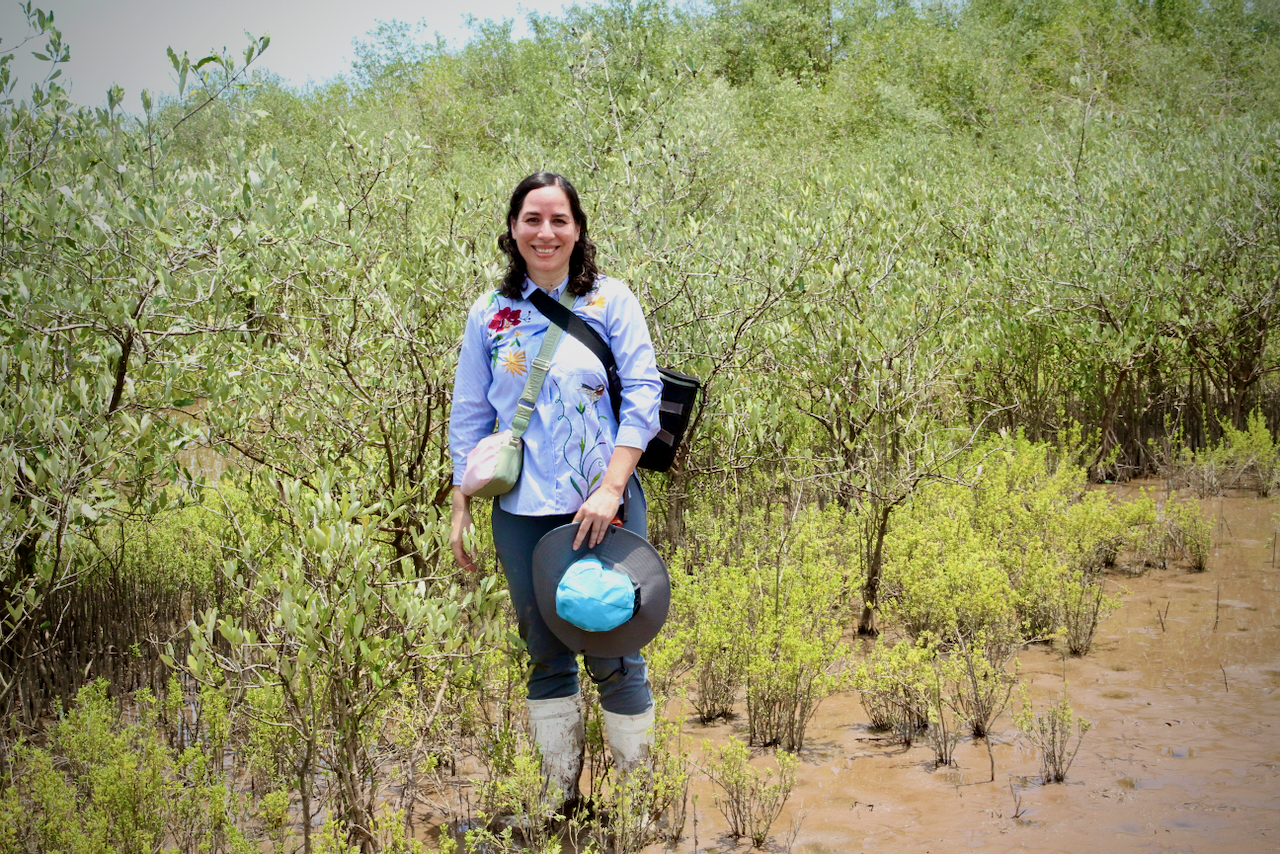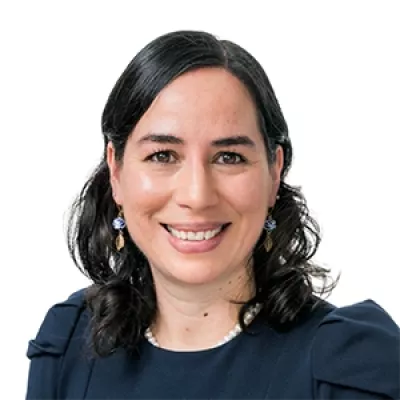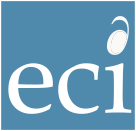Paola Fajardo
Doctor of Philosophy (DPhil) in Geography and the Environment
Supervisors: Prof Yadvinder Malhi and Dr Jesús Aguirre Gutiérrez
Doctor of Philosophy (DPhil) in Geography and the Environment
Supervisors: Prof Yadvinder Malhi and Dr Jesús Aguirre Gutiérrez
Elucidating Mangrove Conservation, Recovery & Sustainable Livelihoods Futures under Environmental and Societal Change
Academic Profile
Paola Fajardo is an interdisciplinary ecologist and DPhil (PhD) Candidate working at the Environmental Change Institute, School of Geography and the Environment at the University of Oxford. For more than 20 years, she has been dedicated to the understanding, protection, and restoration of tropical biomes and their biodiversity - from the ocean to rainforests. She is passionate about the interconnectedness of sciences, arts, cultures, and societies with the Natural World.
Paola earned a BSc in Biology, majoring in Ecology (Summa cum laude) at the University of Guadalajara (Mexico), followed by a Master's in Tropical Biodiversity Conservation and Management at the University CEU San Pablo (Spain). Later, she obtained an MSc in Geography from McGill University (Canada), conducting independent research to assess the sustainability of community-based selective mangrove wood extraction in Mexico.
She holds academic and professional certificates in Tropical Forests Conservation, Sustainable Use, and Restoration from Yale University/ELTI (USA); in Conservation, Restoration, and Wise Use of Wetland Ecosystems and their Biological Diversity from Kushiro International Wetland Centre /JICA (Japan); and on Nature-based Solutions from the IUCN (Switzerland). Paola is fluent in Spanish, English, and French.
Research
Paola’s research is rooted in her academic and professional experiences, which are broad and multidisciplinary, from conducting marine and terrestrial field-based biodiversity assessments for the protection of threatened species and key biodiversity areas, such as coral reefs, to advocating for rights-based conservation approaches at national and international levels. Her work encompasses the cultural, social, ecological, economic, justice, and human dimensions of biodiversity/ecosystem conservation/recovery, and climate change mitigation.
Paola is interested in understanding how past and present land-use and community decision-making processes underpin the conservation and restoration of ecosystems and their biodiversity and visions of the future. She is also studying the links between place-based community conservation and the development and achievement of national and global targets under the auspices of a wide-range of United Nations Multilateral Agreements, such as the Convention on Biological Diversity and the Sustainable Development Goals, and the recognition of Local Communities and Indigenous Peoples’ rights. She has been involved in multilateral and multidisciplinary international environmental agendas and research projects as a principal and co-principal investigator.
Before Oxford, Paola worked on diverse innovative research projects while at McGill University, Montréal, Canada, researching the human well-being and biodiversity impacts of natural climate solutions; the biocultural and human dimensions of ancient tropical forests conservation; and the ecosystem services of mangroves, such as carbon sequestration and habitat for biodiversity. She has participated in research projects regarding the study, conservation, and restoration of diverse biomes and taxonomic groups in Mexico, North America, and globally, and has fieldwork experience in more than 15 countries.
DPhil Research Project: Elucidating Mangrove Conservation, Recovery & Sustainable Livelihoods Futures under Environmental and Societal Change
Paola’s doctoral research focuses on the relationships among place-based nature recovery schemes in Mexico funded by the federal government, local mangrove conservation and management initiatives to boost sustainable livelihoods, efforts to promote and enhance community governance, and participatory nature conservation decision-making processes. Specifically, her work explores the mechanisms and outcomes of community-based mangrove recovery approaches.
“Conserving, restoring, and sustainably managing mangrove ecosystems can figure prominently in climate change mitigation/adaptation and biodiversity conservation strategies of countries hosting extensive mangrove areas. Nevertheless, there is insufficient knowledge about mangrove degradation status, recovery rates, and the contributions of community-based recovery initiatives.”
She aims to fill these knowledge gaps by conducting participatory and collaborative transdisciplinary applied research that draws on natural, social and humanity sciences quantitative and qualitative methods to better appreciate and highlight the socio-cultural, environmental, and economic benefits of community-based mangrove recovery and the co-creation of knowledge. Her research is guided by the needs and aspirations of the local communities she is working with a purpose to continuing building meaningful partnerships and efforts across government programmes and movements pursuing environmental and social justice, system transformational changes, and equity and rights for local communities and Indigenous Peoples.
Paola is using Marismas Nacionales as a case study for her doctoral research - one of the largest mangrove systems in Mexico. Since 2006, she has worked with local partners in Marismas Nacionales, on community-based mangrove restoration and wise use, capacity development, and research projects. Paola’s work will lay an evidence-based foundation to determine baseline socio-ecological mangrove recovery scenarios, inform public policies, and establish permanent non-market-based financial mechanisms to support mangrove conservation and restoration efforts and the local communities that rely on mangroves for their livelihoods.

Professional Profile
Paola has extensive professional experience in programme/project design and management, capacity development, knowledge co-creation, multi-stakeholder engagement, environmental policy, international cooperation, and collaborative action plans to address intertwined economic, societal, and environmental challenges.
Her career has focused on the conservation, restoration, and wise use of wetlands, forests, biodiversity, and climate change mitigation at the science-policy interface in the academic, public, and nonprofit scientific sectors working towards a better understanding and recognition of the central role and benefits of place-based initiatives for the effective preservation and recovery of natural ecosystems.
Paola is interested in advancing transdisciplinary, multifocal and cross-sectorial nature conservation and recovery decision-making and actions considering multiple perspectives and knowledge systems to foster a more equitable and sustainable world. Since the early 2000s, she has advocated for holistic, human rights-based, and participatory approaches to conservation and nature recovery efforts, while also promoting the incorporation of science evidence and traditional knowledge into effective public policies.

‘My passion for human-nature relationships triggered when I was a child, spending hours reading books about ancient cultures and their intertwined connection with the Natural World. Frequenting both coastal and mountainous rural and Indigenous communities as well has inspired my professional and research career.’ Paola Fajardo, 2024
Selected Research Awards and Scholarships
- Mexico’s National Council of Humanities, Sciences and Technologies (CONAHCyT). Doctoral Scholarship.
- Natural Sciences and Engineering Research Council of Canada (NSERC). Doctoral Scholarship.
- Russell E. Train Fellowship / Fonseca Leadership Program. WWF-EFN (USA). Doctoral Award.
- Mexico’s National Council of Science and Technology (CONACyT). MSc Fully Funded Scholarship.
- Russell E. Train Fellowship. WWF-EFN (USA). MSc Research Grant.
- Russell E. Train Fellowship. WWF-EFN (USA). MSc Award.
- Fundación Carolina (Spain). Master Scholarship.
Selected Publications
Peer-reviewed Articles
- Chang, C., … Fajardo, P., et al. (2024) Global evidence of human well-being and biodiversity impacts of natural climate solutions. Nature Sustainability (Accepted).
- Wynes, S., Garard, J., Fajardo, P., et al. (2022) Climate action failure highlighted as leading global risk by both scientists and business leaders. Earth’s Future, 10:e2022EF002857.
- Fajardo, P., et al. (2021) Aichi Target 18 beyond 2020: mainstreaming Traditional Biodiversity Knowledge in the conservation and sustainable use of marine and coastal ecosystems. PeerJ, 9:e9616.
Scientific Reports
- Future Earth, Sustainability in the Digital Age, International Science Council. (2021) Global Risks Perceptions Report 2021.
- Commission for Environmental Cooperation (CEC). (2016) North America's Blue Carbon: Assessing Seagrass, Salt Marsh and Mangrove Distribution and Carbon Sinks. Scientific Report prepared for the Secretariat of the CEC (Mexico / Canada / USA).
Conference Papers
- Fajardo, P., Solís Venegas, J.A., Quintero, H., Valdez Hernández, J.I. (2022) Community-led place-based mangrove ecosystems conservation in West Mexico. XV World Forestry Congress. FAO.
Conference Presentations
- Fajardo, P., et al. (2023) 'Deciphering the socio-ecological benefits of community-based mangrove recovery as cornerstones of long-term sustainable biodiversity, carbon and livelihoods future pathways'. Annual Meeting of the British Ecological Society. Belfast, Northern Ireland, UK. Oral presentation.
- Fajardo, P., Valdez-Hernández, J.I. (2018) 'Achieving mangrove ecosystems conservation and sustainable use in Mexico through Management Units for Wildlife Conservation within and beyond Protected Areas'. 4th World Conference on Marine Biodiversity. Montréal, Québec, Canada.
- Fajardo, P. (2016) 'Community-based Sustainable Mangrove Management: Linking Scientific and Traditional Knowledge'. 3rd Science for Biodiversity Forum 'Mainstreaming biodiversity for well-being: contributions from science to policy'–UN Biodiversity Conference CBD/COP13, Cancún, Mexico.
- Fajardo, P. (2014) 'Community-based Blue Carbon Management in Mexican Mangroves'. Stream Responding to Climate Change. IUCN World Parks Congress, Sydney, Australia. Oral presentation.
- Fajardo, P. (2014) 'Exploring the Payments for Ecosystem Services for Carbon Storage and Sequestration in Mangrove Ecosystems'. ITTO / FAO International Forum on Payments for Environmental Services of Tropical Forests, San José, Costa Rica.
- Fajardo, P. (2013) 'Carbon sequestration services in mangrove forests managed by local communities for conservation and selective wood extraction on Mexico’s Pacific Coast'. ATBC/OTS, San José, Costa Rica.
Outreach
- Fajardo, P., et al. (2021) COP26 Retrospective from GCSE Science Delegates from Higher Education Institutions and Local Governments. The Connection.






